- Register
- Log in to Tune-In
- Wishlist (0)
-
Shopping cart
(0)
You have no items in your shopping cart.
Beatles News

Julian Lennon is gearing up to release his seventh studio album, and it's one that's near and dear to his heart. John Lennon's son decided to name his new project JUDE, which in an homage to "Hey Jude" — The Beatles song Paul McCartney wrote to comfort 5-year-old Julian when his parents separated. The song, of course, became one the band's biggest hits and is still a fan-favorite at McCartney shows.
The singer-songwriter has a love/hate relationship with the track because on one hand, it reminds him of an unhappy time in his life, and on the other, he's grateful for the support McCartney showed through his lyrics. With time, "Hey Jude" became part of his personal identity.
Source: iheart.com
details
Paul McCartney has admitted he still hasn’t planned his forthcoming Glastonbury headline set.
The former Beatle was recently confirmed along with Kendrick Lamar as the final headliners at this year’s bash, joining Billie Eilish who was previously announced in topping the bill on the Pyramid Stage.
When asked what he’s got planned for this year’s event, which will run at Worthy Farm between June 22-26, McCartney told Metro Radio: “Yeah, to tell you the truth we don’t know exactly what we’re going to do yet, but we are definitely planning on having a few tricks up our sleeve…”
Source: By Damian Jones/nme.com
details
Dave Grohl has been melting faces since the late 1980s, first with Nirvana and then with Foo Fighters. However, by 2002, Grohl still hadn’t quite met everyone there was to meet in the industry, including George Harrison‘s son, Dhani Harrison.
Grohl had no idea who Dhani was when they first met. It’s an excusable offense. Dhani might have looked like a carbon copy of his father, but he’d yet to find his own fame.
Thankfully, Grohl quickly realized who he was talking to; otherwise, the surprise of his life might not have come.
Source: cheatsheet.com
details
With writers of the calibre of John Lennon, Paul McCartney and George Harrison, it's no surprise that the number of covers of Beatles songs runs into the thousands. Inevitably, not all of these are going to be classics. Cheap rip-offs and soulless pop interpretations abound, but possibly more numerous are those covers which, understandably, fail to do justice to the originals.
It's arguable that it is the range of Beatles material, as much as the quality, which accounts for why so many artists and bands from such a wide variety of backgrounds have been drawn to their work. Rock, pop, psychedelia and the avant garde all feature in The Beatles' playbook. A good song is a good song, however, and can always be transposed to new setting with positive results.
Source: whatculture.com
details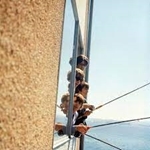
Beatles superfans will surely recognize this iconic 1964 photo capturing music’s most famous quartet fishing from a guestroom of the Edgewater hotel in Seattle, where the band members stayed during their first global tour.
Like the rest of the world, Seattle was so overwhelmed by “Beatlemania” that the Edgewater was the only hotel willing and able to host the band, installing cyclone fencing around its perimeter to keep crazed fans at a safe distance. (Legend has it, some superfans even attempted to swim across the chilly waters of the Bay in the hopes of getting a glimpse of the Brits.) During their stay, now-iconic images were captured of young and playful John, Paul, George, and Ringo hanging fishing poles out the windows of their hotel suite into the waters of Elliott Bay.
Now, nearly 60 years later, the Edgewater is giving Beatles fans the chance to recreate this famous scene with a unique hotel and concert experience timed to the Seattle stop on Paul McCartney's “Got Back” tour this May. The very limited package includes a pre-show dinner, tickets to the concert, luxe round-trip transportation, and a night’s stay in the Edgewater’s Beatles Suite.
Source: El details
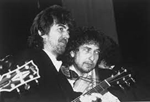
Michael Douglas got a shock when he won his first Golden Globe in 1988. However, Douglas got even more of a surprise when music legends George Harrison and Bob Dylan showed up at his hotel room after the awards to help him celebrate his win.
In 1988, Douglas walked away with his first Golden Globe. He won Best Actor in a Motion Picture Drama for Oliver Stones’ Wall Street.
Douglas thanked Stone in his acceptance speech for giving him such a great role. He starred as the corporate raider Gordon Gekko, who later mentors Charlie Sheen’s character, Bud Fox.
Douglas also won an Oscar for Best Actor for the role. He went up against William Hurt, who recently died on Mar. 13, Marcello Mastroianni, Robin Williams, and Jack Nicholson.
Source: cheatsheet.com
details
Tom Hanks wrote a movie partly inspired by Ringo Starr joining The Beatles.
Hanks drew inspiration from another 1960s rock group while writing the film. The movie included a hit song.
Ringo Starr wasn’t always a member of The Beatles. Tom Hanks watched a documentary that discussed Ringo joining the Fab Four and it subsequently inspired him to write a movie. Notably, Hanks started writing the film to keep his mind off how Forrest Gump would perform during awards season.Hanks directed and wrote That Thing You Do!, a comedy about a fictitious one-hit wonder band named The Wonders. At one point in the film, The Wonders have to replace their bassist before a big performance. This part of the film is connected to Ringo.
Source: cheatsheet.com
details
It doesn’t happen very often in showbiz, but George Harrison and Mick Fleetwood were briefly brothers-in-law. The Fleetwood Mac drummer became George’s brother-in-law when he married Jenny Boyd, the younger sister of George’s wife Pattie Boyd, in 1970.
Although both their marriages ended, the musicians remained friends and bonded over their shared love of tropical climates, Maui, and ukuleles.
The lead guitarist met Pattie while The Beatles filmed A Hard Day’s Night in 1964. He asked her to marry him the first day they met, but they didn’t tie the knot until 1966.
After a turbulent 11-year marriage, George and Pattie officially divorced in 1977. Although, they’d split in 1974 after George cheated on Pattie with Ringo Starr’s wife, Maureen, and Pattie and Eric Clapton revealed they were in love.
Source: cheatsheet.com
details
George Harrison shocked Peter Frampton the first time they met. That’s not uncharacteristic of the “quiet Beatle.” George had a profound effect on many people. Often, he’d utter a witty response while meeting someone new or suggest they do something together that the other person hardly expected.
For instance, the first time he met Eric Idle, he invited him to smoke pot in a projection room at a Monty Python and the Holy Grail screening. Similarly, George smoked pot with Martin Short while watching The Hunt for Red October at a dinner party the first time they met.
Source: cheatsheet.com
details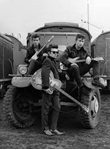
On August 17, 1960, five young Britons were approaching the stage of a small night club in Hamburg, about to play music in that city for the first time. To reach the stage, they had come an almost unimaginable distance. From their home, in Liverpool, they had driven in a cream-and-green minibus to the port of Harwich. The bus, teetering under the weight of amplifiers and instruments, had been lifted onto a ferry by a crane. At first, the stevedores had refused to handle such a precarious load; a photograph captured the moment just after they changed their minds, with the sixties hanging in the balance.
Source: Ted Widmer/newyorker.com
details
George Harrison‘s son, Dhani, said Tom Petty’s death was just as hard for him as his father’s death was in 2001. Petty was one of George’s best friends. Both musicians felt as if they’d known each other in their past lives.
So, naturally, Dhani stayed close to Petty and George’s other friends after George died. Petty supported Dhani through everything. He became a pseudo father, uncle, and best friend.
Petty’s death deeply affected Dhani. He turned to his other uncle figure and his father and Petty’s Traveling Wilburys bandmate, Jeff Lynne, for comfort in the immediate aftermath.
“They’re my family, and they’ve always really looked after me, ever since my father passed away,” Dhani told Billboard. “Yeah, my heart’s broken. It’s tremendously sad and absolutely heartbreaking. He’s one of my best mates. It hasn’t hit me yet how much I’m going to miss him.
Source: cheatsheet.com
details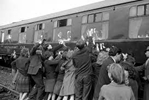
Young fans were desperate to catch the Fab Four as they shot scenes for A Hard Day’s Night on board
The excitement was all too much for hundreds of Beatles fans when the band stopped off at a Somerset seaside town in March 1964 during filming for their highly acclaimed big-screen debut A Hard Day’s Night.
At Minehead, now part of the West Somerset Railway heritage line, one schoolgirl had to be escorted off the tracks by a police officer as she attempted to greet the Fab Four. While other youngsters stood in an orderly fashion next to the railway line, others stormed the tracks, clamouring at the windows of the restaurant car to get their pop idols’ attention.
Source: Jackie Butler/somersetlive.co.uk
details
The Beatles never attended the Grammy Awards. They never sat next to artists like the Mamas and the Papas, or maybe Frank Sinatra, and waited for the announcement. The Beatles never walked to the podium to give a witty speech, thanking fans.
Unfortunately, a Beatle never graced the Grammy stage until after The Beatles broke up.
Initially, their first two wins came in 1965. They won Best New Artist and Best Performance by a Vocal Group (for “A Hard Day’s Night”). That year, they were nominated for Record Of The Year (for “I Want To Hold Your Hand”) and Best Rock & Roll Recording (for “A Hard Day’s Night”).
Source: cheatsheet.com
details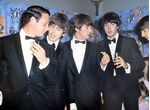
Before The Beatles managed themselves, the boy band had business owner Brian Epstein as their official manager. When talking about this rock group during a The Beatles: Get Back video clip, Epstein said he was “immediately struck” by their stage presence.
John Lennon and Paul McCartney wrote songs together as teenagers. The duo eventually turned into a four-piece band that created original music. In 1961, business owner Epstein signed up to manage “four scruffy, unknown lads,” now known as the Beatles.
These artists became the world’s best-known boy band in the following years. They performed abroad and made history with songs like “I Want To Hold Your Hand.” Even Epstein became well-known by fans, appearing in interviews separate from the group.
Source: cheatsheet.com
details
The Beatles bassist Paul McCartney has been married three times. However, when he tied the knot with his third wife Nancy Shevell, he returned to a place filled with happy memories from his first marriage. McCartney’s 2011 marriage to Shevell at Old Marylebone Town Hall was a full-circle moment for the singer. He first wed Linda Eastman there 42 years prior in 1969. McCartney and Linda would remain married for 29 years until her death in 1998. The couple welcomed three biological children together: Mary, Stella, and James. McCartney adopted Linda’s daughter Heather from a previous marriage shortly after they wed.
Source: cheatsheet.com
details